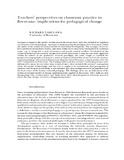Teachers' perspectives on classroom practice in Botswana: implications for pedagogical change

View/
Date
1998-04Author
Tabulawa, R.
Publisher
Routledge http://www.informaworld.comType
Published ArticleMetadata
Show full item recordAbstract
Attempts to improve the quality of education in Botswana have, inter alia, included an emphasis on a learner-centered pedagogy. Attempts at implementing this pedagogy have been made within the ambit of the technical rational model of curriculum development. The attempts, however, have produced inconclusive results, and these results have often been rationalized in technicist terms, e.g. as being due to lack of resources and poorly trained teachers. Overlooked in this technicist model are the teachers' perspectives on the innovation. Using the case-study approach within the rubrics of the qualitative research paradigm, this study sought to establish the perspectives of geography teachers in a senior secondary school in Botswana vis-a-vis the learnercentered pedagogy advocated in Education for Kagisano (Social Harmony), a report produced by the 1977 Commission on Education. The findings indicated that teachers' classroom practices were influenced by many factors other than technical ones: these included the teachers' assumptions about the nature of knowledge and the ways it ought to be transmitted, their perceptions of students, and the goal of schooling. It also emerged that their assumptions were incongruent with the basic tenets of the learner-centered pedagogy. The findings, then, are an indictment of the technical rational model of change implementation applied in Botswana. They indicate that disregarding what teachers know and think about their taken-for-granted classroom practices when effecting change can lead to disappointing results.
